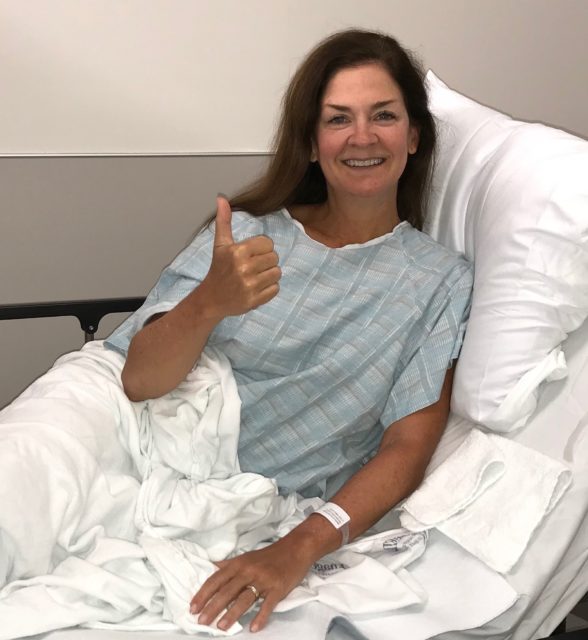 As a medical practice, we promote screening colonoscopies in those 50 and older because they save lives. Though patients are asleep for the actual procedure, the preparation before a colonoscopy can be unpleasant and the flatulence after can be slightly embarrassing. But for one Tryon Medical Partners’ doctor, her colonoscopy brought a Facebook-worthy smile to her face. After Dr. Anne Barnard woke up from her procedure, she asked her husband to take a picture of her and post it on social media, to copious loves, likes and wows.
As a medical practice, we promote screening colonoscopies in those 50 and older because they save lives. Though patients are asleep for the actual procedure, the preparation before a colonoscopy can be unpleasant and the flatulence after can be slightly embarrassing. But for one Tryon Medical Partners’ doctor, her colonoscopy brought a Facebook-worthy smile to her face. After Dr. Anne Barnard woke up from her procedure, she asked her husband to take a picture of her and post it on social media, to copious loves, likes and wows.
“I was grateful to have a clean bill of health, and I am so glad this test exists,” said Dr. Barnard.
In honor of National Colorectal Cancer Awareness Month, we interviewed Dr. Barnard about her experience.
What kind of medicine do you practice?
Anne Barnard (AB): I am a primary care provider for adults. I love my job because of the continuity the doctor-patient relationship provides over years and decades. I treat illnesses that come along, but I also have the opportunity to be preventative. I work hard to understand every patient’s body, mind, and spirit. Medicine should be more than vital signs and adjusting medication.
When did you get your last colonoscopy?
AB: My last colonoscopy was in the summer of 2019, and though that was my first screening colonoscopy, I had two diagnostic colonoscopies that led me to a Celiac Disease diagnosis. I really miss Edible Art cakes, but I am so thankful to my colleague and gastroenterologist, Dr. Scott Smith (of Tryon Medical Partners) for his help in making the diagnosis.
Did you have any reservations about getting one?
AB: Absolutely not. I trusted my doctor 100%, and I have a lot of faith in the safety of the procedure. As an important aside, I would readily select ANY of our excellent Tryon Medical gastroenterologists to care for myself or a family member. That’s why I choose them exclusively for my patients.
What was it like?
AB: The colonoscopy I had last year was easy! Before the procedure, I got a three-page handout with all kinds of tricks, like great suggestions for the clear liquid diet. Even compared to the first colonoscopy I had seven years ago, the prep was much easier to drink. I had my procedure at the Tryon Endoscopy Center, where our team has given lots of care and thought to the process for patient convenience and comfort. I got an IV, went to sleep, and woke up right afterwards. It really only feels like you were out for a few seconds. Then we went to lunch!
What was the worst part?
AB: Having a colonoscopy is a humbling experience. Your body is doing things you cannot necessarily control. For those who struggle with low blood sugar, not eating or drinking can be difficult. But the staff at the endoscopy center know that, and they are there to put you at ease and make the process as comfortable as possible.
Unfortunately, I have had many people around me get diagnosed with colon cancer. It can be a silent killer and the treatment (if not caught early) can be so difficult. The worst part about a colonoscopy is not getting one.
What are your best colonoscopy prep hacks?
AB: Get the prep ice cold, then pinch your nose and chug it! Drink as fast as you can. Then catch a good sporting event on television or have something recorded that you can binge watch. Hit pause when you need to “skip to the loo.”
According to the Centers for Disease Control and Prevention, colorectal cancer is the third leading cause of cancer and second leading cause of cancer deaths in the U.S., among cancers that affect both men and women. More than 150,000 people are diagnosed each year with colon cancer, which will claim more than 50,000 lives this year alone. Most colon cancer can be prevented with a quality colonoscopy at the appropriate time.
More and more young people are being diagnosed with colorectal cancer. Though the recommended age to start regular colorectal screenings is 50 (some recent data actually suggests benefit in starting at 45), you should definitely start earlier if you are considered high risk, or have symptoms like blood in your stool or stomach pain that doesn’t go away. Learn more about colorectal cancer and screening options like colonoscopies.
As Dr. Barnard says, “Just do it.”
